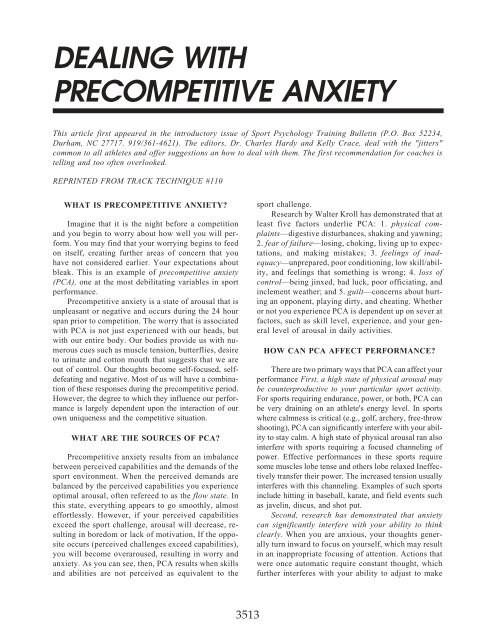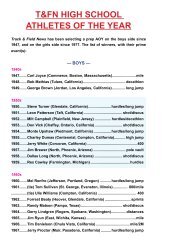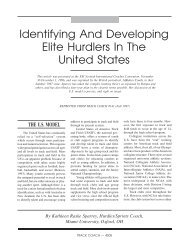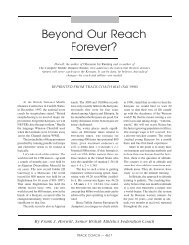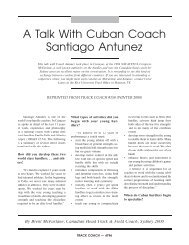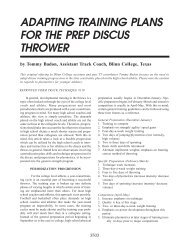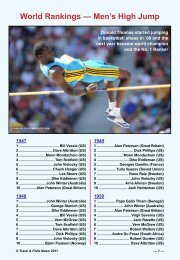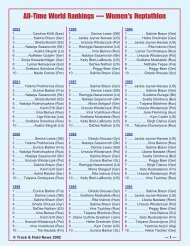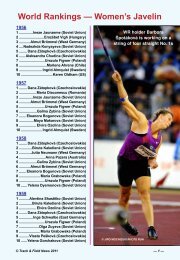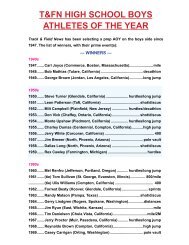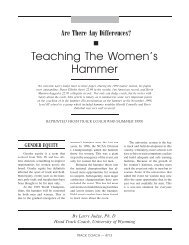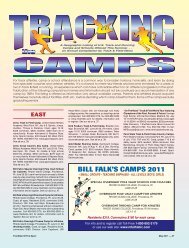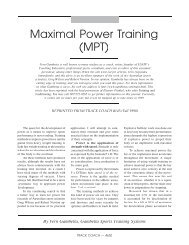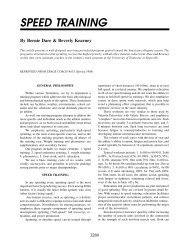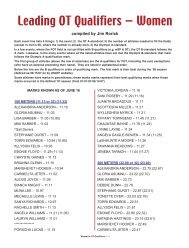DEALING WITH PRECOMPETITIVE ANXIETY - Track & Field News
DEALING WITH PRECOMPETITIVE ANXIETY - Track & Field News
DEALING WITH PRECOMPETITIVE ANXIETY - Track & Field News
You also want an ePaper? Increase the reach of your titles
YUMPU automatically turns print PDFs into web optimized ePapers that Google loves.
<strong>DEALING</strong> <strong>WITH</strong><br />
<strong>PRECOMPETITIVE</strong> <strong>ANXIETY</strong><br />
This article first appeared in the introductory issue of Sport Psychology Training Bulletin (P.O. Box 52234,<br />
Durham, NC 27717. 919/361-4621). The editors, Dr. Charles Hardy and Kelly Crace, deal with the "jitters"<br />
common to all athletes and offer suggestions an how to deal with them. The first recommendation for coaches is<br />
telling and too often overlooked.<br />
REPRINTED FROM TRACK TECHNIQUE #110<br />
WHAT IS <strong>PRECOMPETITIVE</strong> <strong>ANXIETY</strong>?<br />
Imagine that it is the night before a competition<br />
and you begin to worry about how well you will perform.<br />
You may find that your worrying begins to feed<br />
on itself, creating further areas of concern that you<br />
have not considered earlier. Your expectations about<br />
bleak. This is an example of precompetitive anxiety<br />
(PCA), one at the most debilitating variables in sport<br />
performance.<br />
Precompetitive anxiety is a state of arousal that is<br />
unpleasant or negative and occurs during the 24 hour<br />
span prior to competition. The worry that is associated<br />
with PCA is not just experienced with our heads, but<br />
with our entire body. Our bodies provide us with numerous<br />
cues such as muscle tension, butterflies, desire<br />
to urinate and cotton mouth that suggests that we are<br />
out of control. Our thoughts become self-focused, selfdefeating<br />
and negative. Most of us will have a combination<br />
of these responses during the precompetitive period.<br />
However, the degree to which they influence our performance<br />
is largely dependent upon the interaction of our<br />
own uniqueness and the competitive situation.<br />
WHAT ARE THE SOURCES OF PCA?<br />
Precompetitive anxiety results from an imbalance<br />
between perceived capabilities and the demands of the<br />
sport environment. When the perceived demands are<br />
balanced by the perceived capabilities you experience<br />
optimal arousal, often refereed to as the flow state. In<br />
this state, everything appears to go smoothly, almost<br />
effortlessly. However, if your perceived capabilities<br />
exceed the sport challenge, arousal will decrease, resulting<br />
in boredom or lack of motivation, If the opposite<br />
occurs (perceived challenges exceed capabilities),<br />
you will become overaroused, resulting in worry and<br />
anxiety. As you can see, then, PCA results when skills<br />
and abilities are not perceived as equivalent to the<br />
sport challenge.<br />
Research by Walter Kroll has demonstrated that at<br />
least five factors underlie PCA: 1. physical complaints—digestive<br />
disturbances, shaking and yawning;<br />
2. fear of failure—losing, choking, living up to expectations,<br />
and making mistakes; 3. feelings of inadequacy—unprepared,<br />
poor conditioning, low skill/ability,<br />
and feelings that something is wrong; 4. loss of<br />
control—being jinxed, bad luck, poor officiating, and<br />
inclement weather; and 5. guilt—concerns about hurting<br />
an opponent, playing dirty, and cheating. Whether<br />
or not you experience PCA is dependent up on sever at<br />
factors, such as skill level, experience, and your general<br />
level of arousal in daily activities.<br />
HOW CAN PCA AFFECT PERFORMANCE?<br />
There are two primary ways that PCA can affect your<br />
performance First, a high state of physical arousal may<br />
be counterproductive to your particular sport activity.<br />
For sports requiring endurance, power, or both, PCA can<br />
be very draining on an athlete's energy level. In sports<br />
where calmness is critical (e.g., golf, archery, free-throw<br />
shooting), PCA can significantly interfere with your ability<br />
to stay calm. A high state of physical arousal ran also<br />
interfere with sports requiring a focused channeling of<br />
power. Effective performances in these sports require<br />
some muscles lobe tense and others lobe relaxed Ineffectively<br />
transfer their power. The increased tension usually<br />
interferes with this channeling. Examples of such sports<br />
include hitting in baseball, karate, and field events such<br />
as javelin, discus, and shot put.<br />
Second, research has demonstrated that anxiety<br />
can significantly interfere with your ability to think<br />
clearly. When you are anxious, your thoughts generally<br />
turn inward to focus on yourself, which may result<br />
in an inappropriate focusing of attention. Actions that<br />
were once automatic require constant thought, which<br />
further interferes with your ability to adjust to make<br />
3513
quick, on-the-spot decisions. In addition, these thoughts<br />
may be negative and result in preoccupation with what<br />
you can't do, rather than what you can do.<br />
DOES NERVOUSNESS ALWAYS LEAD TO<br />
BAD PERFORMANCES?<br />
Definitely not. Whenever you anticipate an event<br />
that is important to you, it is normal to feel some<br />
nervousness. In fact, it is a sign of readiness. This type<br />
of readiness is known as positive arousal and is usually<br />
referring to many of the physical cues you experience.<br />
Elite athletes channel this energy to work for them<br />
rather than against them. Answers to the following<br />
questions may help you distinguish between positive<br />
arousal and negative anxiety:<br />
1. How much does my sport require me lobe 'pumped'<br />
as I enter the competition? Some sports may require<br />
a higher state of arousal (e.g., weight lifting)<br />
than others (e.g., golf).<br />
2. Do I often have thoughts of self-doubt about my<br />
ability?<br />
3. Do I often have thoughts about factors that are<br />
beyond my control?<br />
Answering "Yes" to the last two questions iron<br />
indication that you are moving from positive arousal to<br />
negative anxiety. If you find yourself nervous but still<br />
confident in your ability, that is a sign of readiness.<br />
However, worrying about your ability to perform at<br />
levels that you normally are able to perform with ease,<br />
or worrying about factors over which you have no<br />
control may interfere with your ability to enter a competition<br />
mentally ready.<br />
RECOMMENDATIONS FOR ATHLETES<br />
1. Become more aware of your optimal level at<br />
arousal. Think of the times when you felt ready going<br />
into a competition and it worked for you. Think of<br />
other times when you were anxious and it interfered<br />
with your performance. Being as specific as possible,<br />
write down the differences between these times based<br />
on three questions (a) What thoughts made you feel<br />
ready, and what thoughts made you anxious?; (b) What<br />
feelings did you experience when you were ready versus<br />
when you were anxious?; and (c) What were the<br />
differences in your behavior between these times?<br />
This will allow you to start looking for patterns<br />
that may help you become more ware of what best<br />
prepares you mentally for a competition. Examples of<br />
when you were anxious may include thinking about<br />
whether you had prepared enough for the competition,<br />
exaggerating the skill of your opponent(s), or exaggerating<br />
the importance of the outcome of the competition.<br />
Feelings may have been an overly high sense of<br />
arousal that led you to emotionally "avoid" the competition<br />
rather than "move toward" the competition. You<br />
may have found that, behaviorally, you were more<br />
anxious when you were around others rather than by<br />
yourself. The important point is to start understanding<br />
the factors that allow you to become motivated for a<br />
competition, and the factors that tend to take you too<br />
far. A good rule of thumb is to notice when you begin<br />
to focus intently on the competition and become excited<br />
about approaching the competition. This is a<br />
good indication that you are reaching your optimal<br />
level, If self doubt occurs and you are having trouble<br />
putting it aside, you have most likely crossed into the<br />
"anxiety zone." The following recommendations may<br />
help during those times.<br />
2. Focus on things that are within your control.<br />
One of the major sources of anxiety is worrying about<br />
factors that are beyond your control. Your thoughts<br />
become preoccupied with a series of "what ifs." A<br />
great method of counter balancing this attitude is to<br />
become more performance-oriented. Being performance-oriented<br />
means that you are concerned with the<br />
thing that is most in your control—your performance.<br />
Performance-oriented athletes are more satisfied with<br />
a loss if they played their best, than if they had won and<br />
played poorly. Conversely, being outcome-oriented<br />
means that you are concerned with one thing—the win,<br />
It doesn't matter how you get there, as long as you have<br />
the big "W." We are certainly not trying to suggest that<br />
winning is not important. Of course it is; we all enjoy<br />
the thrill of winning. However, by placing the highest<br />
importance on the outcome, think of the added pressure<br />
you have placed upon yourself. We should hasten<br />
to add that it is unnecessary pressure. So many other<br />
factors beyond your control play into whether or not<br />
you win (e.g., the opponent's ability, where you are<br />
playing, coaching, weather). Most of our anxiety lies<br />
in the fear of the unknown. We can reduce this fear by<br />
pulling in the ranks to focus on what is truly within our<br />
control. When you think about it, being more performance-oriented<br />
is likely to increase your chances of<br />
winning. You will be approaching the competition<br />
focused on what you can do and what needs to be done<br />
to perform your best.<br />
In addition, as you begin concentrating on your<br />
performance in the precompetitive period it is usually<br />
best to concentrate on your strengths. Focus on what<br />
you can do, not what you can't do. Practice is where<br />
you work on your weaknesses. The competition is the<br />
time to capitalize on your strengths and on your improved<br />
areas. Therefore, focus intently on these areas.<br />
If you feel your arousal level getting too high, take a<br />
moment to regroup and say to yourself "OK, I'm going<br />
to show them what l can do, and not worry about what<br />
I can't do. I'm going to give 100% of the potential I<br />
3514
have today." The bottom line is to learn to focus on<br />
doing the best you can with what you have at that<br />
moment, and view any positive outcome as a bonus. If<br />
you do well, take the time to focus on how that makes<br />
you feel. If you win, it makes your performance that<br />
much sweeter.<br />
3. Use "performance cues" to develop or retrain<br />
your arousal level. It is important to realize that<br />
with mental training you are developing skills in much<br />
the same way you develop physical skills. You can<br />
recall when you first started learning a new level of<br />
your sport, how you had to think about every little<br />
movement. Eventually, as you practiced these new<br />
skills they became more habitual. It is the same way<br />
with mental skills. Your typical arousal level has been<br />
developed over time and may have become habitual.<br />
To retrain your arousal level, you simply have to learn<br />
new mental routines and practice them until they become<br />
automatic. In sport, however, athletes may need<br />
to do this quickly, rather than constantly rehearse long<br />
statements to themselves.<br />
One helpful exercise is to reflect on how you want<br />
to play given your presents skill level. Your desired<br />
performance maybe are collection of past accomplishment<br />
or an image of a future performance. Once you<br />
have a clear image of a desired performance, label<br />
that performance with a representative cue word, statement,<br />
or symbol. When doing this, you may choose to<br />
use a general cue that reflects your overall performance,<br />
or a cue that reflects a more specific part of<br />
your performance. In addition, you may want to incorporate<br />
a cue that reminds you of a time when you<br />
competed at your desired level. Experiment with all<br />
three types of cues, separately or in combination, to<br />
determine which works best for you. The most important<br />
thing to remember is that this label must immediately<br />
recall the image of a performance that you want<br />
to create. An example is a rawer who used the cue<br />
"cougar" to represent explosive speed as a way of<br />
preparing for a sprint race, and "swan" to represent<br />
long, smooth rowing strokes as a way of preparing for<br />
a middle distance race.<br />
The next step is incorporating this performance<br />
cue into your pre-game preparation. Reflect on your<br />
cue as a method of motivation. You can also use it to<br />
reduce your arousal level if you start experiencing<br />
anxiety. If you start feeling anxious, take a deep breath,<br />
relax, and repeat the cue to yourself. Try to focus fully<br />
on what it represents to you. This will result in bringing<br />
you back to performance-oriented thoughts that<br />
will property prepare you for the competition. With<br />
practice and repetition, these thoughts will become<br />
more habitual and capable of controlling your arousal<br />
level.<br />
The same principle is utilized often with music<br />
tapes. Many athletes hove a favorite song that has the<br />
effect of psyching them up, and another song that<br />
relaxes them. Oaring the precompetitive period, they<br />
will listen to one or both of the songs at times when<br />
they want to modify their arousal levels. They have<br />
essentially found a perform once cue that induces a<br />
feeling that they are trying to achieve. The important<br />
thing is to find what's right for you. It may take some<br />
trial-and-error, but will eventually result in approaching<br />
a competition in a manner that will allow you to<br />
enjoy your sport at its optimal level.<br />
RECOMMENDATIONS FOR COACHES<br />
1. Became aware at your own arousal levels and<br />
how they interact with the athlete and other coaches.<br />
It is important to spend time reflecting on your own<br />
arousal levels as a way of understanding how they<br />
impact your effectiveness in coaching and your impact<br />
on other's performances. Applying the suggestions in<br />
Recommendations for Athletes to your coaching performance<br />
can help you understand and develop your<br />
optimal arousal level, as well as deal with PCA.<br />
2. Understand your athletes, individually, as to<br />
ham they react daring the precompetitive period.<br />
Recognize those athletes who are usually ally under<br />
aroused and those who are usually ally overaroused for<br />
the demands of your sport. The under aroused athletes<br />
maybe those who typically take awhile to find their<br />
groove and appear sluggish during the early parts of<br />
the competition. The overaroused athletes, on the other<br />
hand, can be detected most often by being strong "practice-players."<br />
These are the athletes who do great in<br />
practice but have trouble realizing their potential in<br />
competition. Performances during competition are a<br />
regression for them rather than a progression.<br />
3. Allow time tar athletes to individually prepare<br />
themselves mentally far the competition. Research<br />
has demonstrated that the famous "win one for<br />
the flipper" pep-talks are relatively short-lived in their<br />
effectiveness. Oaring pregame preparation, it may be<br />
helpful to bring the team together to review and discuss<br />
strategy. Following this meeting, individuals<br />
should be allowed some time on their own to prepare<br />
for the game in a way that is most effective for them.<br />
On not underestimate the power of this gesture. Many<br />
athletes are very concerned about how they present<br />
themselves to their coach. If they have tapped into how<br />
you would like your athletes to prepare, they will most<br />
likely present that image to you. However, this maybe<br />
totally opposite of what they need. Conveying the<br />
message that you respect their methods of preparation<br />
frees them up to devote time to it. Some athletes may<br />
want to be by themselves, some may want lobe with<br />
others to discuss the game, others may want to be with<br />
3515
teammates for humorous small- talk as a way of reducing<br />
their anxiety. Allow them to go through the trialand-error<br />
of finding out what in best for them. Following<br />
this individual lime, bring them back together and<br />
summarize the team goals you hope to accomplish. In<br />
addition, incorporating individual time for the coaches<br />
is equally important for their preparation.<br />
4. Foster a performance-oriented attitude in<br />
your athletes. An was explained in Recommendations<br />
for Athletes, athletes need to focus on what they can<br />
control. So many factors beyond their control play a<br />
part as to whether they win. Placing a high priority on<br />
outcome results in unnecessary pressure and extra factors<br />
that athletes worry about. Unfortunately, a coach's<br />
livelihood is dependent upon outcome. Job stability<br />
and opportunity for professional advancement usually<br />
hinges on the win-loss record. As stated before, we are<br />
not implying that winning is unimportant. We are stating,<br />
however, that placing winning an the top priority<br />
can have negative effects on an athlete's mental preparation<br />
and subsequent performance. Remember, your<br />
greatest chance for a positive outcome is to have each<br />
athlete play at his/her potential. This can best be<br />
achieved by having your athletes focus on what they<br />
can control-their performance. Teaching athletes to<br />
appreciate the importance of gauging success by how<br />
well they perform according to their own potential<br />
rather than by other's standards is one of the greatest<br />
lessons a coach can teach.<br />
5. Be specific with your suggestions to help athletes<br />
with PCA. It is easy to create a situation where<br />
an athlete struggling with PCA starts to "worry about<br />
worrying." Be careful to keep helpful suggestions specific<br />
to the actions that the athlete finds troublesome,<br />
rather than identifying or characterizing the athlete by<br />
the weakness he/she demonstrates. If the athlete begins<br />
to view him/herself as a "choker," he/she creates a self<br />
fulfilling prophesy that will ensure further PCA. A<br />
coach can be extremely helpful in showing the athlete<br />
that it is only one part of his/her game and can be<br />
viewed as a challenge for improvement rather than a<br />
permanent birthmark.<br />
6. As your time allows, try to schedule periodic<br />
individual meetings that focus on the issue of mental<br />
training. Once again, don't underestimate the power<br />
of this gesture. You are letting them know that you<br />
view their mental training as important and you are<br />
there to help them in that regard. Most importantly, it<br />
breaks down the barrier that athletes may feel to always<br />
present themselves as mentally tough 100% of<br />
the time. Such meetings may remove concern athletes<br />
may have about being an imposter around you, constantly<br />
fearing what will happen "if coach finds out<br />
what I am really like." Let them know that dedicating<br />
time to their weaknesses as well as strengths will not<br />
jeopardize their position but contribute to their potential<br />
as an athlete.<br />
RECOMMENDATIONS FOR PARENTS<br />
1. Become aware of your own arousal levels and<br />
how they interact with your child. How many of us<br />
have experienced the extreme tension and anxiety associated<br />
with watching our child participate in sports?<br />
It is important to spend time reflecting on your own<br />
arousal levels as a way of understanding how they<br />
impact your child's enjoyment and performance in<br />
sports. Applying the suggestions in Recommendations<br />
for Athletes can help you deal with any anxiety you<br />
may experience.<br />
2. Foster a performance-oriented attitude in<br />
your young athlete. As parents, one of the easiest<br />
questions for us to ask our children after a competition<br />
is "Did you win?" Unfortunately, this question tends to<br />
foster an outcome-oriented attitude in children. Children<br />
pick up very quickly what are important measures<br />
of success. It is a parent's responsibility to gently guide<br />
them into measuring success by their ability to do the<br />
best that they can. Helping them focus on what they<br />
can control will be a major factor in reducing PCA for<br />
athletes as they grow and develop. This can be facilitated<br />
by asking them questions that encourage them to<br />
reflect on their performance, rather than the outcome.<br />
Refer to the other previous sections for further information<br />
about performance-versus outcome-orientations.<br />
3. Look for clues as to what their motivation is<br />
for participating in sport and its possible effect on<br />
PCA. Research has indicated that the vast majority of<br />
youth sports participants engage in athletics for fun<br />
being around their friends, and using their friends as a<br />
guide to comparing their own abilities. Winning actually<br />
is a low priority for youth as they first begin to<br />
participate in athletics. Does this profile fit your child?<br />
If not, look for the influences that may be directing<br />
your child. While you may not be able to change other's<br />
influences, you can certainly counterbalance them by<br />
bringing fun back into the purpose of athletics and<br />
focusing on their performance (see #1).<br />
If your child is becoming unusually nervous before<br />
a competition, it may be a sign that he or she is<br />
participating for reasons other than his/her own. We<br />
have worked with a number of children who have<br />
become acutely aware that they receive the most attention<br />
from their parents when they are participating in<br />
sports. Their number one reason for participating in sports<br />
is to seek approval from their parents. Before a competition,<br />
these children become very anxious because they<br />
are in conflict: "I don't really want to do this, but I want<br />
my parents to be proud of me." If this is characteristic of<br />
your child, reinforce the notion that your love for him/ her<br />
3516
is independent of his/her participation in sport.<br />
As a parent, ask yourself two tough questions:<br />
1. Am I trying to relive my youth through my kids?<br />
2. Am I using sport as a "toughening" process for my<br />
kids? One of the greatest gifts we can give our children<br />
is to support them as they discover, through trial-anderror,<br />
where their talents and interests lie. To reach<br />
their potential in any activity requires dedication and<br />
commitment. Realizing that factor alone is the only<br />
kind of "toughening" they need. You may find that<br />
your children will discover a new interest in sport that<br />
is based on their own motivation.<br />
4. Assist your child in distinguishing times when<br />
things clicked for him/her versus times when PCA<br />
significantly interfered with his/her performance.<br />
Young athletes may have trouble finding clues as to<br />
why they are experiencing PCA. Parents can help by<br />
guiding them through the process of becoming more<br />
aware of their arousal levels and where their optimal<br />
level is. Guiding them through the questions suggested<br />
in #1 of Recommendations for Athletes may be helpful.<br />
3517


